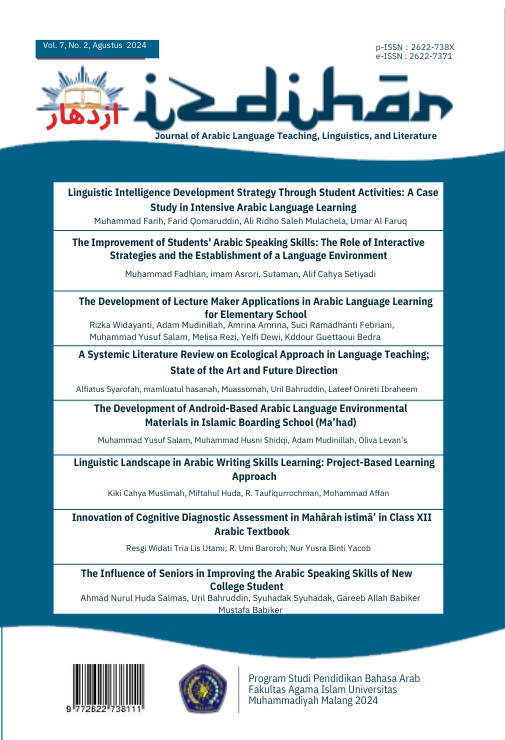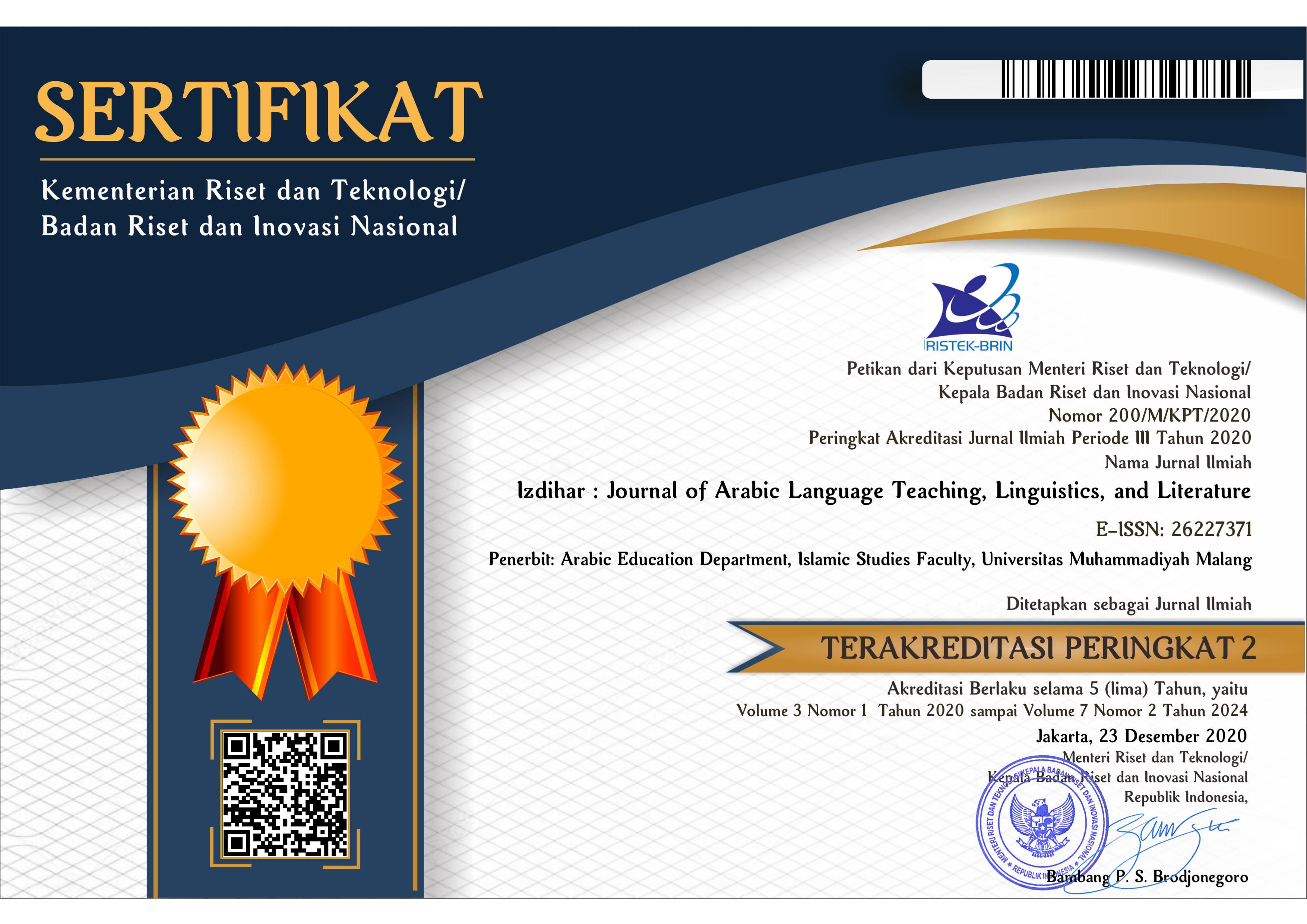The Influence of Seniors in Improving the Arabic Speaking Skills of New College Student
DOI:
https://doi.org/10.22219/jiz.v7i2.31607Keywords:
Teaching ArabicAbstract
This research explained the role of seniors in assisting new students at Sekolah Tinggi Ilmu Bahasa Arab (STIBA) in enhancing their Arabic speaking proficiency. The research methodology employed in this study is qualitative research and case study design. Data are gathered through observations and interviews. The findings of this research indicate that seniors have a significant impact on helping new students to improve their Arabic speaking skills at STIBA Ar-Rayyah. Seniors serve as mentors, peers, and a support system that provides positive encouragement to new students. They offer guidance and support both within the campus dormitories and outside, engaging in various activities where Arabic is the primary communication language. Seniors also motivate and help new students gain confidence in speaking Arabic and overcome learning obstacles. This research underscores the importance of non-academic aspects in the educational institution, such as motivation and emotional support, which can have a positive impact on academic performance and personal development of students. The role of seniors at STIBA Ar-Rayyah fosters a conducive learning environment that aids new students in enhancing their Arabic speaking skills
Downloads
References
Al Fudiah, N., Suci Qur’ani, A., Mufidah, N. & Amrullah, A. M. K. (2023). Organizational management of the student executive board of STIBA Ar-Raayah Sukabumi. Pediaqu: Jurnal Pendidikan Sosial Dan Humaniora, 2(1), 317–325. https://publisherqu.com/index.php/pediaqu/article/view/139
Ar-Raayah, S. (2023). Visi STIBA Ar-Raayah.
Ardian, D. (2023). Analisis Peran Senior dalam Upaya Meningkatkan Kualitas Pengasuhan Taruna di Akademi Penerbang Indonesia Banyuwangi. Jurnal Akuntansi, Manajemen, Dan Perencanaan Kebijakan, 1(2), 1–8. https://doi.org/10.47134/jampk.v1i2.90
Astuti, R., Akla, A. & Sarbaini, A. (2020). Strategi Pembentukan Lingkungan Berbahasa Arab di Madrasah Aliyah. An Nabighoh: Jurnal Pendidikan Dan Pembelajaran Bahasa Arab, 22(01), 17. https://doi.org/10.32332/an-nabighoh.v22i01.2075
Az-Zahidda, W. (2009). Mentoring Fun (1st ed.). Solo Indiva Media Kreasi.
Djajasudarma, T. F. (2006). Metode linguistik: Ancangan metode penelitian dan kajian.
Garnida, D. & Sumayyah, D. (2015). Pengantar pendidikan inklusif.
Güvendir, M. A. (2016). Students’ extrinsic and intrinsic motivation level and its relationship with their mathematics achievement. International Journal for Mathematics Teaching and Learning, 17(1). https://doi.org/10.4256/ijmtl.v17i1.9
Huda, S., Alim, A. & Mujahidin, E. (2023). Model Pembelajaran Keterampilan Bahasa Arab Pada Program Prakuliah di STIBA Ar-Raayah Sukabumi. Edukasi Islami: Jurnal Pendidikan Islam, 12(02). https://doi.org/10.30868/ei.v12i02.4336
Ismail, A., Abu Bakar, R., Abg Abdullah, D. N. M., Maja, A., Guatleng, C. O. & Abdullah, M. M. (2007). Peranan Program Mentoring dalam Pembangunan Pelajar: Satu Kajian di Sebuah Universiti Awam di Malaysia Timur.
Kaswan. (2012). Coaching Dan Metoring Untuk Pengembangan SDM Dan Peningkatan Kinerja Organisasi. Alfabeta.
Kusumah, M. W. (2019). Ar Raayah Profile.
Marpuah, S. & Sulton. (2019). The mastery of Arabic language communication with communicative active method. Humanities and Social Sciences Reviews, 7(3), 484–490. https://doi.org/10.18510/hssr.2019.7371
Moleong, L. J. (2007). Metodologi penelitian kualitatif edisi revisi.
Nations, U. (2023). Official Languages of The UN. https://www.un.org/en/our-work/official-languages
Ngah, E., Fauzi, W. J., Radzuan, N. R. M., Abdullah, H., Ali, A. Z. M., Abidin, N. A. Z. & Fadzillah, F. I. M. (2022). Snapticon: Developing Effective Listening Skills for Group Oral Discussion. Asian Journal of University Education, 18(2), 361–374. https://doi.org/10.24191/ajue.v18i2.17991
Nhut, N. M. (2021). Assessment of ITP learners’ english: A needs analysis. Journal of Language Teaching and Research, 12(5), 822–828. https://doi.org/10.17507/jltr.1205.22
Qurani, A. S., Solihati, S., Al Fudiah, N., Mufarokah, S., Istiadah, I. & Firdaus, R. (2023). Pembelajaran Bahasa Arab di UIN Maulana Malik Ibrahim dan STIBA Ar-Raayah. Kalamuna: Jurnal Pendidikan Bahasa Arab Dan Kebahasaaraban, 4(1), 41–57. https://doi.org/10.52593/klm.04.1.03
Rasyad, M. A., Lestari, R. P. & Rahim, F. K. (2019). بجامعة الراية سوكابومي إدارة برنامج تعليم اللغة العربية للطلبة في السنة الأول. LISANIA: Journal of Arabic Education and Literature. https://doi.org/10.18326/lisania.v3i1.91-112
Sugiyono, D. (2013). Metode penelitian pendidikan pendekatan kuantitatif, kualitatif dan R&D.
Yah, M. H. & Lubis, M. A. (2018). Students’ Intrinsic and Extrinsic Motivation in Arabic Reading Skill-Activities | Motivasi Intrinsik dan Ekstrinsik Pelajar Dalam Aktiviti Kemahiran Membaca Teks Arab. Global Journal Al-Thaqafah, 8(2), 97–107. https://doi.org/10.7187/GJAT122018-9
Downloads
Published
How to Cite
Issue
Section
License
Copyright (c) 2024 Ahmad Nurul Huda Salmas, Uril Bahruddin, Syuhadak Syuhadak

This work is licensed under a Creative Commons Attribution-ShareAlike 4.0 International License.
Copyright Notice
Authors who publish with this journal agree to the following terms:
- Authors retain copyright and grant the journal right of first publication with the work simultaneously licensed under a Creative Commons Attribution-ShareAlike 4.0 International License that allows others to share the work with an acknowledgment of the work's authorship and initial publication in this journal.
- Authors are able to enter into separate, additional contractual arrangements for the non-exclusive distribution of the journal's published version of the work (e.g., post it to an institutional repository or publish it in a book), with an acknowledgment of its initial publication in this journal.
- Authors are permitted and encouraged to post their work online (e.g., in institutional repositories or on their website) prior to and during the submission process, as it can lead to productive exchanges, as well as earlier and greater citation of published work (See The Effect of Open Access).
Copyright (c) 2019 Izdihar : Journal of Arabic Language Teaching, Linguistics, and Literature

This work is licensed under a Creative Commons Attribution-ShareAlike 4.0 International License.


















